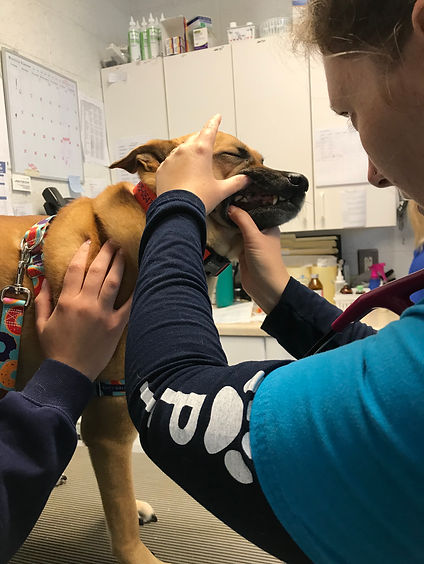When did you realize you wanted to become a veterinarian, and what motivated or inspired you to pursue it?
Dr. Mirante: I have wanted to be a vet for as long as I can remember, even being in pre-school and just knowing that is what I wanted to do. I am not sure where the inspiration came from, but I knew that this was my goal and I wanted to achieve it.
What would you say based upon your experiences was the most challenging part of becoming/being a veterinarian? How did you deal with these challenges?
Dr. Mirante: Once you get into vet school comes with a lot of stress and pressure to succeed greatly in all of your courses and classes, and that was a very challenging aspect of this process. Also having to experience certain things that may be out of your comfort zone, and experiencing things in ways that you never have before. I went to vet school in Dublin Ireland, and I had to work on farms in a place I have never been before with many people I have never met, and having to adapt to this unfamiliar environment is very challenging. You really need to be willing to put yourself out there and learn to push through and dive into these types of experiences. The best way to deal with these challenges is to focus on your main/end goal and using this as motivation to push through all of the stresses that come with vet school. Just keeping in mind that "this too shall pass" is key to overcoming many challenges, and you will realize that it was all worth it in the end.
What is the most impactful experience you encountered in vet school?
Dr. Mirante: When I was attending vet school in Dublin Ireland we did a clinical rotation with an organization centered in the UK known as Dogs Trust UK. Here we performed spays and neuters all day. This was a great experience because it was an exciting and intriguing environment, and being able to perform such beneficial surgeries throughout the day was such a memorable experience.
What advice would you give to someone who wants to get into vet school and pursue veterinary medicine?
Dr. Mirante: From a financial standpoint I would say do not do it because of how incredibly expensive it is. If you want to pursue this career you must be passionate about it. This is a work of passion, it is not a work of getting rich or making a lot of money. It is important to be prepared for the challenges you will face, and it is even more important to be able to focus on your end goal and push through these challenges. I had my first job at 15, and I was working in an environment with animals trying to gain experience. I remember my mother telling me that it was too early to start, but it is never to early to start gaining experience and preparing yourself for your future. It is also very important to go to an AVMA accredited school because if you do not it is very challenging to find work after vet school. If you do not go to an AVMA accredited vet school you only have the right to practice in the state of New York and Ohio, and if you wish to gain more freedom career-wise you must travel and take a test that is hosted in Las Vegas in order to prove to the board of veterinary medicine that your qualifications are equivalent to those acquired in an AVMA accredited vet school.

What is the most rewarding aspect of this career, what would you say makes all of the challenges worth enduring?
Dr. Mirante: Definitely helping the animals, and being able to see how we positively impact their life and their owner's life as well is definitely the most rewarding. Especially, working in the animal shelter because the majority of the animals we take in have come from very bad situations, so having the opportunity to help them and witness the way their life changes after we help them is amazing, and that is why I love working here so much.